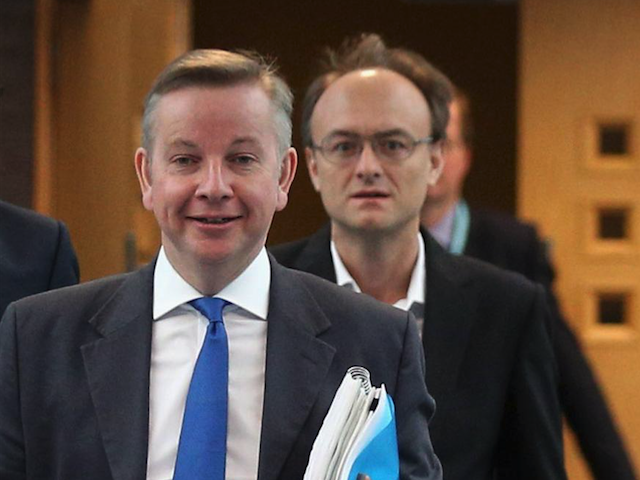Yesterday the Justice Secretary and senior Vote Leave campaigner Michael Gove said the United Kingdom would not need to invoke Article 50 of the Lisbon Treaty – commonly believed to be the best way to Leave the European Union (EU) – in the event of a vote to leave. Many Brexiteers were confused, but his camp has made this argument before, and here’s why.
This is the ‘soft’ Eurosceptic’s attempt to get undecided voters on side; to focus on ‘moderates’ whilst sidelining the will of ‘hard’ Eurosceptics and UK Independence Party supporters (UKIPers); and, potentially, to secure their preferred future leader of the Conservative Party.
Mr. Gove is a devotee of the Tory-led Vote Leave, and the man behind their thinking on the matter, and a former adviser to Mr. Gove, is Dominic Cummings. On the 21st of January Mr. Cummings told the Economist: “… A lot of people have been saying that as soon as there is a Leave vote then the Article 50 process begins straight away. Completely wrong. In fact that would be like putting a gun in your mouth and pulling the trigger.”
Article 50 stipulates we must leave within two years. True Brexiteers might see this as a guarantee of freedom, but Mr. Cummings sees it as ticking time bomb. And maybe that’s because freedom is not necessarily what the soft Tory Eurosceptics want.
“No-one in their right mind would begin a legally defined two-year maximum period to conduct negotiations before they actually knew, roughly speaking, what this process was going to yield”, warns Mr. Cummings.
Perhaps this speaks to a lack of planning on the Vote Leave side’s part. Maybe they don’t know enough about what Brexit looks like, or maybe they don’t have enough people inside Number 10, or the civil service, to be confident in their approach. More likely is the fact that they want to hold fire until they can orchestrate a new Conservative Party leadership challenge, to which some might argue: Tories are putting party before country (again).
“I think that is a distinct possibility [that the government would seek to hold another referendum, on the terms of Brexit]”, he adds later.
Some members of Vote Leave have been quite open about their desire to retain ‘associate’ members of the EU. To them, the referendum is just the long game towards a ‘reformed’ EU. To them, a vote to leave would be merely to gain extra bargaining chips to bring back to Chancellor Merkel and Jean Claude Juncker.
But, the No-Article-50 stance is also to draw in so-called ‘undecided voters’. It shows how the Vote Leave bunch takes the support core Eurosceptics and UKIPers for granted, and how they may be prepared to disregard their views at a later stage.
Instead of immediately embracing our newfound sovereignty and ability to build international relationships, this camp appears to want to put everything on ice and find a middle path.
Mr. Cummings said he want to “explain to the public” that “nothing changes the next day” and “a new government team is going to sit down with the EU and figure out what this new relationship should look like legally…. before any formal process happens”.
Without immediately invoking Article 50, and so keeping the option of a second referendum open, he hopes to tempt ‘moderates’ and undecided voters who might be scared by the finality, immediacy, and irreversibility of a vote to leave.
This is misled. According to the latest polls, just 5 per cent of voters are undecided. Most of them are probably apathetic, too, and therefore not even likely to turn out to vote.
So why water down the case for Brexit by focusing on what is nearly a margin of error? Even if you take the 13 per cent number of Don’t Knows that ICM polling suggests exists – how many of these can you possibly hope to convert? Is the strategy genuinely to win by one or two per cent? Far better to suppress the other side’s “soft” vote by throwing uncertainty at their biggest narrative: the economic benefits of EU membership.
And Vote Leave appears to be failing to mobilise the core Brexit supporters too. Just look at Boris’s rally, with a few hundred hand-picked supporters, versus the average Grassroots Out rally – with thousands of average punters.
What’s more, the prospect of a second referendum may only confuse and even anger potential out voters, and leave them unsure as to what they are voting for. Remain activists claim that ‘no one knows what Brexit will look like’, and advocating a second vote will only reinforce this argument.
Voters want certainty. Brexiteers want—can you guess?—Brexit.
The other dimension to all of this is the question of who will be the next Tory leader. Boris Johnson wants Boris Johnson. Dan Hannan wants Michael Gove. Dominic Cummings wants Michael Gove. But does Michael Gove want Michael Gove?
On the 14th January, Mr. Cummings tweeted that, “[David Cameron’s] leadership successors will make clear they do NOT support immediate A50”.
“We’re a campaign group. But I think it is perfectly possible that leadership candidates to replace David Cameron will… offer the public a voice on what the deal looks like”, he added.
Vote Leave isn’t the government (yet); they can’t call a second referendum. But, whoever does, if the notion is supported within the Tory party, stands a stronger chance of becoming the next leader.
It is quite possible that Mr. Gove is positioning himself as that man. It would be wise, therefore, to remain cautious of his call to abandon Article 50.
Raheem Kassam contributed to this report

COMMENTS
Please let us know if you're having issues with commenting.